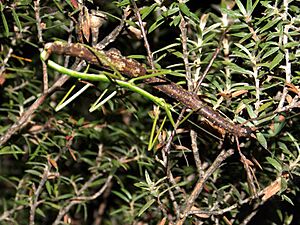Clitarchus tepaki facts for kids
Quick facts for kids Clitarchus tepaki |
|
|---|---|
| Scientific classification | |
| Kingdom: | |
| Phylum: | |
| Class: | |
| Order: | |
| Superfamily: |
Phasmatinae
|
| Family: | |
| Genus: | |
| Species: |
C. tepaki
|
| Binomial name | |
| Clitarchus tepaki Buckley, Myers and Bradler, 2014
|
|
Clitarchus tepaki is a type of stick insect found only in New Zealand. It belongs to a common group of stick insects called Clitarchus. This special insect lives only in the North Cape area of New Zealand, especially in places like Te Paki and the Karikari Peninsula.
About the Te Paki Stick Insect
Clitarchus tepaki is a medium-sized stick insect. It does not have wings. Its body can be green or a mix of brown and grey. Sometimes, it has small bumps called tubercles on its back.
This stick insect likes to live in small parts of forests. It eats leaves from several plants. These include Metrosideros perforata, Metrosideros bartlettii, and manuka (Leptospermum scoparium). It also eats kanuka (Kunzea species) and pohuehue (Muehlenbeckia australis).
Where It Lives
You can find Clitarchus tepaki in only two main areas. These are the Te Paki or North Cape area and the Paraawanui uplands. Paraawanui is a volcanic area in the Karikari Peninsula.
Within Te Paki, this stick insect has been seen in many spots. These include Spirits Bay, Tom Bowling Bay, and Unuwhao. These areas were cut off from the rest of New Zealand a long time ago. Because of this, they are home to many unique species found nowhere else.
Outside these specific areas, you will find a different stick insect species. It is called Clitarchus hookeri.
How It Got Its Name
Scientists Buckley, Myers, and Bradler officially named C. tepaki in 2014. Its species name, "tepaki", comes from the Te Paki area. This place is known for having many unique plants and insects.
Some other special species found there include Leucopogon xerampelinus and Placostylus ambagiosus. Another stick insect, Tepakiphasma ngatikuri, also lives there.
The local Ngāti Kurī people of Northland gave it a Māori name. They call it whē o Ngāti Kurī. This name connects the insect to their tribal area, which includes North Cape.


